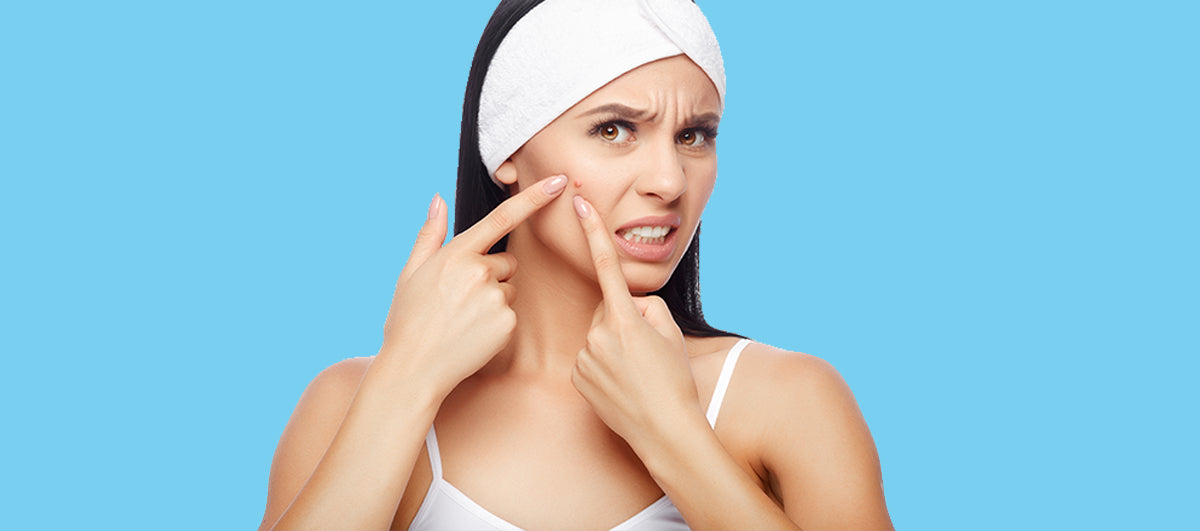Are you experiencing a forehead full of pimples, deep zits on the chin, and pus-filled bumps on both sides of cheeks at the same time every month? If this is your condition then you might be the victim of hormonal acne. Acne that occurs due to fluctuations in the levels of your hormones called “hormonal acne”. With the elevated levels of certain hormones, your body starts producing sebum more than normal. Sebum is an oily or waxy like substance, secreted by sebaceous glands that keep our skin and hair moisturized. However, when sebum production at the base of hair increases it further clogs hair follicles that cause whiteheads, blackheads, and finally resulting in acne flare-up.
A study published in Indian Journal of Endocrinology and Metabolism has highlighted the stress as a major factor behind hormonal acne. Not only this, the ramifications of hormonal acne appear to manifest in people’s lives in the form of poor self-image, low confidence, and social isolation. However, if you are suffering from hormonal acne, then you will be happy to know that there is a possibility to regain your confidence and flawless skin.
Top 7 tips
If you are dealing with hormonal acne, your first step should be to track monthly hormonal fluctuations. Start noticing when you normally experience acne flare-up and which part does it usually occur. Apart from this, certain other ways have been identified as effective to tackle mild to moderate acne problems.
- Avoid harsh ingredients
- Don’t over wash your face
- Eat a healthy diet
- Say “no” to heavy makeup
- OTC products
- Keep your hands off your face
- Reduce your stress

1. Avoid harsh ingredients
It becomes pertinent to pay special attention to ingredients present in your skin care products if you are dealing with acne. Avoid using chemical-laden face wash because they can worsen up the acne conditions. Use a mild and non-comedogenic cleanser, which is free of sulphate and parabens.
2. Does not over wash your face
The American Academy of Dermatology explains that washing your face too many times in a day can cause skin irritations that ultimately end up with more severe outbreaks. The ideal option is to cleanse your face twice a day only.
3. Eat a healthy diet
A research study of 2013 has stated that dietary fatty acids help to modify the functions of hormones in the body. Diet enriched with antioxidants, nutrients, proteins, and essential minerals play a crucial role in balancing the hormonal irregularities in the body. Benefits of vegan diet are highly appraised to attain clear, spot-free, and healthy skin.
4. Say “no” to heavy makeup
Minimal makeup look is an important tip for people who have acne prone skin. Slathering on too many makeup products causes the clogging of pores, which may further increase the risk of worsening the current acne condition along with causing more breakouts.
5. OTC products
Topical ointments are found to provide satisfactory results in preventing and treating active acne. Rice Bran, Boswellia Serrata & Scutellaria Extract are common topical acne agents, which help to treat acne along with promoting good skin health. Anti-inflammatory, antimicrobial, and skin healing properties of these natural ingredients make them an effective solution for acne prevention.
6. Keep your hands off your face
Avoid touching, scraping, or picking pimples, since it may worsen the inflammation along with infection. Dermatologists explain that the act of popping pimples can lead to acne scars.
7. Reduce your stress
The wellness of mind and skin are interrelated since many of our nerve endings are connected to the skin. Hence, all the good and bad emotions you feel have an impact on our epidermis. Several studies have found that just like stomach health, stress, and anxiety are equally responsible for causing skin problems.

It is quite normal to get acne during puberty or periods days. However, if your zit lingers for days or months, then it is advised not to take it lightly. Severe inflammatory conditions of acne can cause atrophic and hypertrophic scars. Spotting red bumps on your face early and offering the right treatment can save your skin from irreversible damage. Above all, tell yourself every day that acne free, flawless, and radiant skin is possible.
P.S.
Contrary to the popular belief, applying sunscreen can exacerbate your acne. However, unprotected sun exposure to UV rays is known to damage different layers of skin which subsequently worse your acne flare-up. Dermatologists recommend using physical sunscreens for people with acne prone skin. Importantly, the treatment of acne entirely depends upon the severity of outbreaks, which varies from person to person. If you are still noticing and encountering acne despite making modifications in your skin care regimen and daily lifestyle choices then it is prudent to visit a dermatologist.




